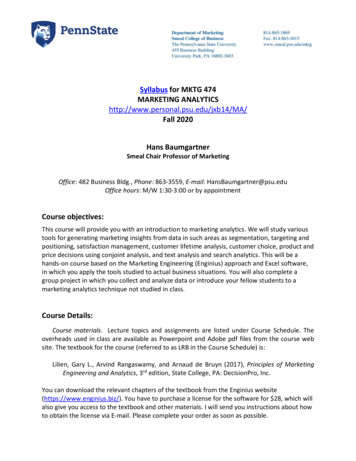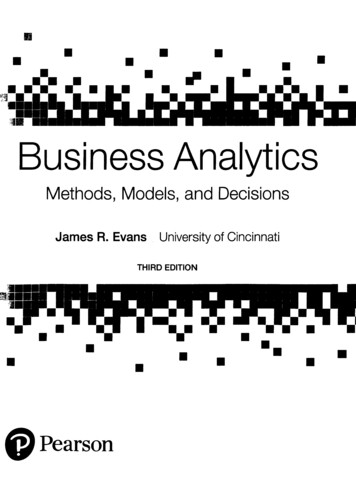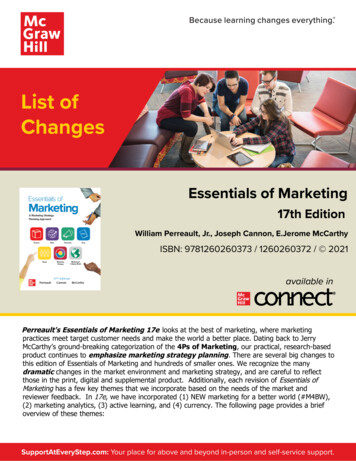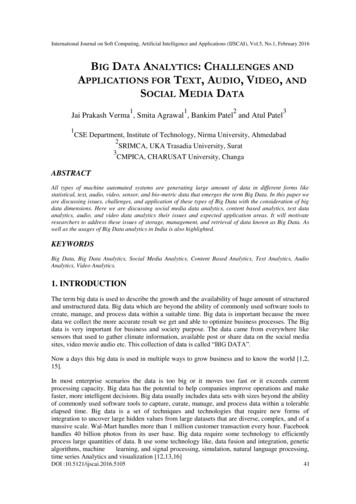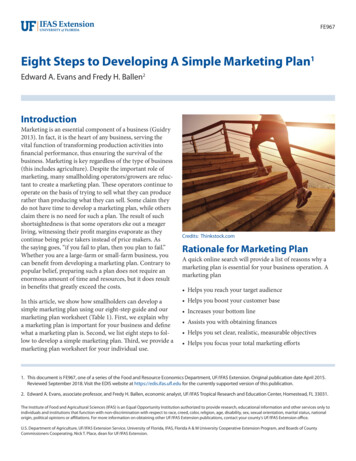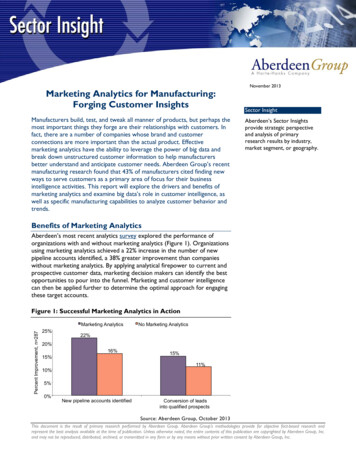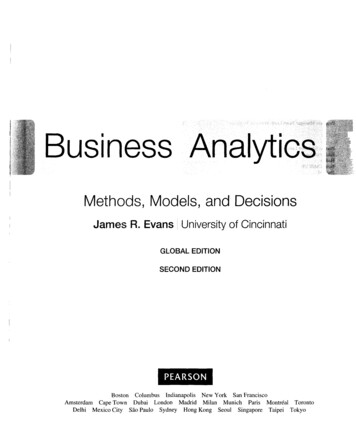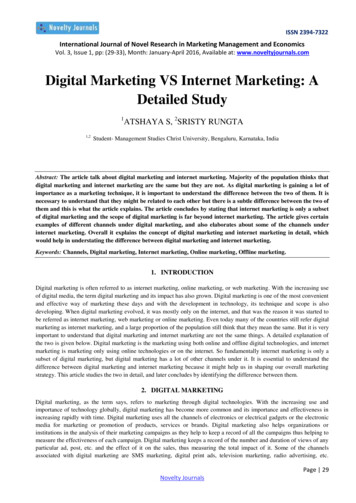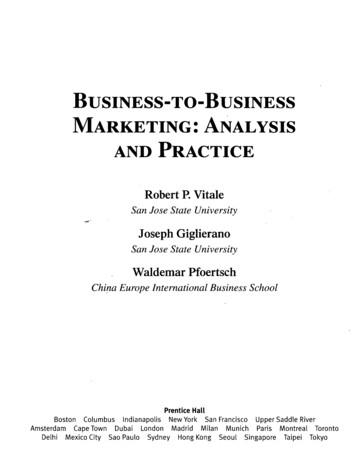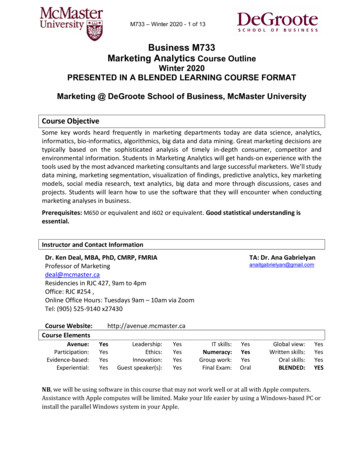
Transcription
M733 – Winter 2020 - 1 of 13Business M733Marketing Analytics Course OutlineWinter 2020PRESENTED IN A BLENDED LEARNING COURSE FORMATMarketing @ DeGroote School of Business, McMaster UniversityCourse ObjectiveSome key words heard frequently in marketing departments today are data science, analytics,informatics, bio-informatics, algorithmics, big data and data mining. Great marketing decisions aretypically based on the sophisticated analysis of timely in-depth consumer, competitor andenvironmental information. Students in Marketing Analytics will get hands-on experience with thetools used by the most advanced marketing consultants and large successful marketers. We’ll studydata mining, marketing segmentation, visualization of findings, predictive analytics, key marketingmodels, social media research, text analytics, big data and more through discussions, cases andprojects. Students will learn how to use the software that they will encounter when conductingmarketing analyses in business.Prerequisites: M650 or equivalent and I602 or equivalent. Good statistical understanding isessential.Instructor and Contact InformationDr. Ken Deal, MBA, PhD, CMRP, FMRIAProfessor of Marketingdeal@mcmaster.caResidencies in RJC 427, 9am to 4pmOffice: RJC #254 ,Online Office Hours: Tuesdays 9am – 10am via ZoomTel: (905) 525-9140 x27430Course Website:Course ential:TA: Dr. Ana :Guest speaker(s):YesYesYesYesIT skills:Numeracy:Group work:Final Exam:YesYesYesOralGlobal view:Written skills:Oral skills:BLENDED:YesYesYesYESNB, we will be using software in this course that may not work well or at all with Apple computers.Assistance with Apple computes will be limited. Make your life easier by using a Windows-based PC orinstall the parallel Windows system in your Apple.
M733 – Winter 2020 - 2 of 13Course DescriptionYou’ve heard about the “Tipping Point”. Well, that is has occurred in marketing analytics. Welcome to theshow. The public used to hear about selling and advertising and very little else about marketing. Now thecore of what we do is in the media daily – predictive analytics, segmentation, big data, social media, textanalytics. Some are construing this as threats to our privacy – and we must be diligent to protect ouridentities. However, much of this new movement in marketing analytics is focused on understandingconsumers’ sentiments and behaviours so that better marketing decisions can be made to grow business andthat only happens when consumers get more of what they want.Marketing Analytics M733 will introduce you to the concepts of marketing analytics, assist you to betterunderstand how marketing analytics can be used for improving marketing decisions and will continue youreducation in analysis so that you can contribute to the development of marketing insights. You will beexposed to many influential Canadian contributors to marketing analytics and to projects that will expandyour expertise in this valuable arena.Learning OutcomesUpon completion of this course, you will have had the opportunity and training to: Understand the needs of marketing managers for marketing intelligence; Determine and react to the objectives set for marketing analytics projects; Identify the type of analyses that will best help achieve the objectives; Understand the meaning and value of big data and social media analytics; Appreciate the basics of R, the most pervasive analytics tool, and methods that use R; Understand how to manage and execute marketing analytics projects; Learn how to prepare data for analysis; Determine how to best analyze diverse types of data; Learn how to turn statistical findings into marketing information that gets attention.Required Course Materials and Readings Chapman, Chris and Elea McDonnell Feit, R for Marketing Research and Analytics, Springer,2019 (bookstore). This is an excellent book on using R for marketing analytics and marketingresearch. This book will be used in parallel to much of the course. Some topics will not becovered in class and several topics that will be covered in class are not in this book.Fox, John (2017). Using the R Commander: A Point-and-Click Interface for R. Boca Raton,Florida: CRC Press.Rodrigues, Bruno (2019). Modern R with the tidyverse. You can buy this book fromhttps://leanpub.com/modern tidyverse , or you can read the book online for free: https://brodrigues.github.io/modern R/.R, RStudio, R Commander (all open source and free)Gandomi, Amir and Murtaza Haider (2015). “Beyond the hype: Big data concepts, methods,and analytics”, International Journal of Information Management 35 (2015) 137-144. (inAvenue)
M733 – Winter 2020 - 3 of 13 Please do not communicate with others electronically during residencies and stay off theinternet unless it is for class reasons. Keep your laptops closed during guest speaker visits.EvaluationTeaching MethodThe main learning platform in this course will be three (synchronous) face-to-face residencies that willinclude topic presentations, class discussions and guest speakers, asynchronous content videos accompaniedby PowerPoint decks, four major assignments, synchronous webinars, intra-course chats and a term project.Residencies will consist of lectures, workshops and guest speakers and will be held on Jan 18, Feb 29 andMarch 28th. Webinars will introduce topics, elaborate and reinforce the course notes provided in Avenueand discuss your assignments and projects. The videos will introduce, discuss and provide examples of allcourse material and will be backed up by PowerPoint decks and/or R Markdown documents.Four major assignments will be required during the term. They must be conducted individually andany cheating will be considered serious violations of academic dishonesty and dealt withaccordingly. All work will be evaluated on an individual basis except in certain cases where groupwork is expected.The groups for the term projects will be comprised of 3 people whenever possible. Group memberswill share the same grade for the term project, adjusted by peer evaluation. The term projectpresentations will be on April 17th (date approximate) during a residency that will last about 5 hours.All students are required to attend the full session.Your final grade will be calculated as follows:Components and WeightsAssignmentsTerm projects4 assignments, due throughout the termAssigned by the 6th week, presented duringscheduled final exam. (90% analysis and report,10% presentation)Total50%50%100%NB: attendance at all residencies are required. Absence will result in course failureautomatically.Grade ConversionAt the end of the course your overall percentage grade will be converted to your letter grade in accordancewith the following conversion scheme.LETTER GRADEPERCENTPOINTS
M733 – Winter 2020 - 4 of 13A AAB BBF90 - 10085 - 8980 - 8475 - 7970 - 7460 – 6900 - 591211109870Communication and FeedbackStudents that are uncomfortable in directly approaching an instructor regarding a course concern may senda confidential and anonymous email to the respective Area Chair or Associate t/anonymous/Students who wish to correspond with instructors or TAs directly via email must send messages that originatefrom their official McMaster University email account. This protects the confidentiality and sensitivity ofinformation as well as confirms the identity of the student. Emails regarding course issues should NOT besent to the Administrative Assistant.Instructors are encouraged to conduct an informal course review with students by Week #4 to allow time formodifications in curriculum delivery. Instructors should provide evaluation feedback for at least 10% of thefinal grade to students prior to Week #8 in the term.AssignmentsThere will be four major assignments during the term. These will constitute 50% of your final mark. Theseassignments must be done by each individual student without help from others and submitted to theAvenue Drop Box when required. The assignments will be scrutinized for cheating and appropriate steps willbe taken if collaboration is discovered. Each assignment must be placed in the appropriate Avenue Drop Boxby the required time and date. The Avenue dropbox will close at the prescribed time. Late assignments willreceive grades of zero. This is a marketing analytics course, i.e., the analysis must be done correctly and tothe proper extent and the results must be interpreted to support better marketing decisions. The lack ofeither of these two essential components will cause reduction in grades. Feedback will be provided throughAvenue.MidtermThere will be no midterms.Term ProjectsThe term projects will be focused on providing commercial grade experiences in marketing analytics. Theseprojects will be assigned to teams and it is expected that each team member contribute appropriately andequally to the end result. There will be a vehicle for adjusting grades if a team member were to notparticipate adequately. The term projects will be presented orally during the scheduled final exam period for
M733 – Winter 2020 - 5 of 13this course. Essentially, these will be the final exams. The topics for the projects may be contributed by theguest speakers.Final Marks in M733A passing mark in M733 indicates that the professor attests that the student has at least an adequateproficiency in marketing analytics and should be able to contribute to the analytical functions of themarketing department of an organization. If the professor is not able to attest to this achievement, thestudent will receive a grade of F.Academic DishonestyIt is the student’s responsibility to understand what constitutes academic dishonesty. Please refer to theUniversity Senate Academic Integrity Policy at the following Integrity.pdfThis policy describes the responsibilities, procedures, and guidelines for students and faculty should a caseof academic dishonesty arise. Academic dishonesty is defined as to knowingly act or fail to act in a way thatresults or could result in unearned academic credit or advantage. Please refer to the policy for a list ofexamples. The policy also provides faculty with procedures to follow in cases of academic dishonesty as wellas general guidelines for penalties. For further information related to the policy, please refer to the Officeof Academic Integrity htMcMaster University has signed a license with the Canadian Copyright Licensing Agency (Access Copyright)which allows professors, students, and staff to make copies allowed under fair dealing. Fair dealing with awork does not require the permission of the copyright owner or the payment of royalties as long as thepurpose for the material is private study, and that the total amount copied equals NO MORE THAN 10percent of a work or an entire chapter which is less than 20 percent of a work. In other words, it is illegal to:i) copy an entire book, or ii) repeatedly copy smaller sections of a publication that cumulatively cover over10 percent of the total work’s content. Please refer to the following copyright guide for further ng.pdfMissed Academic WorkMissed Mid-Term Examinations / Tests / Class Participation
M733 – Winter 2020 - 6 of 13Where students miss a regularly scheduled mid-term or class participation for legitimate reasons asdetermined by the MBA Academic Services Office, the weight for that test/participation will be distributedacross other evaluative components of the course at the discretion of the instructor. Documentationexplaining such an absence must be provided to the MBA Academic Services Office within five (5) workingdays upon returning to school.To document absences for health related reasons, please provide the Petition for Relief for MBA MissedTerm Work and the McMaster University Student Health Certificate which can be found on the DeGrootewebsite at pplications/. Please do not use theonline McMaster Student Absence Form as this is for Undergraduate students only. University policy statesthat a student may submit a maximum of three (3) medical certificates per year after which the student mustmeet with the Director of the program.To document absences for reasons other than health related, please provide the Petition for Relief for MBAMissed Term Work and documentation supporting the reason for the absence.Students unable to write a mid-term at the posted exam time due to the following reasons: religious; workrelated (for part-time students only); representing university at an academic or varsity athletic event;conflicts between two overlapping scheduled mid-term exams; or other extenuating circumstances, have theoption of applying for special exam arrangements. Such requests must be made to the MBA AcademicServices Office at least ten (10) working days before the scheduled exam along with acceptabledocumentation. Instructors cannot themselves allow students to unofficially write make-upexams/tests. Adjudication of the request must be handled by the MBA Academic Services Office.If a mid-term exam is missed without a valid reason, students will receive a grade of zero (0) for thatcomponent.Missed AssignmentsFailure to submit any assigned material at the designated due time to the appropriate Avenuefolder without a formal release due to one of the excuses noted above will result in a grade ofzero.There will be formal peer evaluations of teamwork with corresponding reductions in marks ifdeemed necessary by the professor.Missed Final Examinations (Term Project Presentations)A student who misses a final examination without good reason will receive a mark of 0 on the examination.All applications for deferred and special examination arrangements must be made to the MBA AcademicServices Office. Failure to meet the stated deadlines may result in the denial of these arrangements.Deferred examination privileges, if granted, must be satisfied during the examination period at the end ofthe following term. There will be one common sitting for all deferred exams.
M733 – Winter 2020 - 7 of 13Failure to write an approved deferred examination at the pre-scheduled time will result in a failure for thatexamination, except in the case of exceptional circumstances where documentation has been provided andapproved. Upon approval, no credit will be given for the course, and the notation N.C. (no credit) will beplaced on the student’s transcript. Students receiving no credit for a required course must repeat the course.Optional or elective courses for which no credit is given may be repeated or replaced with another course ofequal credit value.Requests for a second deferral or rescheduling of a deferred examination will not be considered.Any student who is unable to write a final examination because of illness is required to submit the Applicationfor Deferred MBA Final Examination and a statement from a doctor certifying illness on the date of theexamination. The Application for Deferred MBA Final Examination and the McMaster University -and-applications/ Please do not use the online McMasterStudent Absence Form as this is for Undergraduate students only. Students who write examinations whileill will not be given special consideration after the fact.In such cases, the request for a deferred examination privilege must be made in writing to the MBA AcademicServices Office within five business days of the missed examination.Special examination arrangements may be made for students unable to write at the posted exam time dueto compelling reasons (for example religious, or for part-time students only, work-related reasons): Students who have religious obligations which make it impossible to write examinations at the timesposted are required to produce a letter from their religious leader stating that they are unable to bepresent owing to a religious obligation.Part-time students who have business commitments which make it impossible to write examinationsat the times posted are required to produce a letter on company letterhead from the student’simmediate supervisor stating that they are unable to be present owing to a specific job commitment.In such cases, applications must be made in writing to the MBA Academic Services Office at least ten businessdays before the scheduled examination date and acceptable documentation must be supplied.If a student is representing the University at an academic or athletic event and is available at an overlappingscheduled time of the test/examination, the student may write the test/examination at an approved locationwith an approved invigilator, as determined by the MBA Academic Services Office.In such cases, the request for a deferred examination privilege must be made in writing to the MBA AcademicServices Office within ten business days of the end of the examination period.Note: A fee of 50 will be charged for a deferred exam written on campus and a fee of 100 for deferredexams written elsewhere. In cases where the student’s standing is in doubt, the Graduate Admissions andStudy Committee may require that the student with one or more deferred examination privileges refrainfrom re-registering until the examination(s) have been cleared.
M733 – Winter 2020 - 8 of 13Student Accessibility ServicesStudent Accessibility Services (SAS) offers various support services for students with disabilities. Studentsare required to inform SAS of accommodation needs for course work at the outset of term. Students mustforward a copy of such SAS accommodation to the instructor normally, within the first three (3) weeks ofclasses by setting up an appointment with the instructor. If a student with a disability chooses NOT to takeadvantage of an SAS accommodation and chooses to sit for a regular exam, a petition for relief may not befiled after the examination is complete. The SAS website is:http://sas.mcmaster.caPotential Modifications to the CourseThe instructor and university reserve the right to modify elements of the course during the term. Theuniversity may change the dates and deadlines for any or all courses in extreme circumstances. If either typeof modification becomes necessary, reasonable notice and communication with the students will be givenwith explanation and the opportunity to comment on changes. It is the responsibility of the student to checktheir McMaster email and course websites weekly during the term and to note any changes.Research Using Human SubjectsResearch involving human participants is premised on a fundamental moral commitment to advancinghuman welfare, knowledge and understanding. As a research intensive institution, McMaster Universityshares this commitment in its promotion of responsible research. The fundamental imperative of researchinvolving human participation is respect for human dignity and well-being. To this end, the Universityendorses the ethical principles cited in the Tri-Council Policy Statement: Ethical Conduct for ResearchInvolving Humans:http://www.pre.ethics.gc.caMcMaster University has mandated its Research Ethics Boards to ensure that all research investigationsinvolving human participants are in compliance with the Tri-Council Policy Statement. The University iscommitted, through its Research Ethics Boards, to assisting the research community in identifying andaddressing ethical issues inherent in research, recognizing that all members of the University share acommitment to maintaining the highest possible standards in research involving humans.If you are conducting original research, it is vital that you behave in an ethical manner. For example,everyone you speak to must be made aware of your reasons for eliciting their responses and consent toproviding information. Furthermore, you must ensure everyone understands that participation is entirelyvoluntary. Please refer to the following website for more information about McMaster University’s researchethics zations that you are working with are likely to prefer that some information be treated as confidential.Ensure that you clarify the status of all information that you receive from your client. You MUST respect this
M733 – Winter 2020 - 9 of 13request and cannot present this information in class or communicate it in any form, nor can you discuss itoutside your group. Furthermore, you must continue to respect this confidentiality even after the course isover.
M733 – Winter 2020 - 10 of 13
M733 – Winter 2020 - 11 of 13Career ProfileDr. Ken Deal, M.B.A., Ph.D., CMRP, FMRIAProfessor of Marketing, DeGroote School of Business, McMaster UniversityAreas of ExpertiseKen’s expertise lies in the area of using sophisticated marketing analytics andmarketing research to provide significant insights that help organizations build andenhance marketing strategies. He has developed marketing models to assess thepotential of new products, evaluate the effectiveness of advertising and to enhancemarketing decisions in a variety of management areas. Ken has substantialexperience in the health sector, pharmaceutical research, energy sector,telecommunications, tourism, aviation industry, financial services, automotive partsand service, government services, environmental issues, packaged goods, retailgrocery and others.Dr. Deal has provided expert testimony to the Federal Court of Canada, theSuperior Court of Ontario, the Supreme Court of Ontario, U.S. courts andprofessional tribunals and has advised several government departments on strategyand their markets.He has presented executive seminars in strategic marketing for private, publicand non-profit sectors, in marketing research, pricing and in other topics. Ken is anactive teacher, researcher and practitioner in marketing research, marketingmodeling, marketing management and strategy.Professional ActivitiesDr. Deal’s most recent book Modern Marketing Research: Step by Step was coauthored with Chuck Chakrapani and was revised in 2010 as an e-book. MarketingResearch: Methods and Canadian Practice, again co-authored with Chakrapani, waspublished in April 1992 by Prentice-Hall. Ken also wrote A Guide to PASW (SPSS)Statistics 18 and is available as an internet book. These books add to Dr. Deal’s otherpublications that have appeared in a variety of professional and academic journals.Dr. Deal was Chairman of Strategic Market Leadership and Health ServicesManagement at McMaster University from 1998 to 2007, a position he held from1982 to 1986 and was acting chair of Strategic Management in 2012/13 and actingchair of marketing in 2019. He served as President of the Canadian Survey ResearchCouncil in 2000/2001, President of the Professional Marketing Research Society(now, Marketing Research and Intelligence Association, MRIA) in 1998/1999. Kenwas elected Lifetime Fellow of the Professional Marketing Research Society (FMRIA)in 2000 for “his outstanding contributions to marketing research in Canada”. He hasbeen a professor of marketing in McMaster University’s DeGroote School of Businesssince 1973. Dr. Deal is president of marketPOWER research inc. and is a CertifiedMarketing Research Professional (CMRP).
M733 – Winter 2020 - 12 of 13Business M733 – Marketing Analytics, 2020Project Team #Project Title:Project Leader:Team Members:email addresses,phone numbers1.2.3.4.
M733 – Winter 2020 - 13 of 13M733 in Winter 2020 -- And you are ?Name:Address:City:Phone: email:Undergraduate degree:Undergraduate university:McMaster MBA Stream:Are you in the Co-op programme or Full-time programme or Part-time programme?Which of the following courses have you taken or are you taking currently?TookPreviously TakingCurrently M650 I602 Your grade in I602 [ ] I604 M731, Marketing Research M732, Consumer Behaviour M734, Strategic Marketing Analysis M724, Innovation and New Products K723, Data Mining and Business Intelligence O701, Modelling and Analytics using Spreadsheets Other statistics or analytics coursesCurrent or most recent job:Intended career business sector:Next previous position:
Learn how to turn statistical findings into marketing information that gets attention. Required Course Materials and Readings Chapman, Chris and Elea McDonnell Feit, R for Marketing Research and Analytics, Springer, 2019 (bookstore). This is an excellent book on using R for marketing analytics and marketing research.
